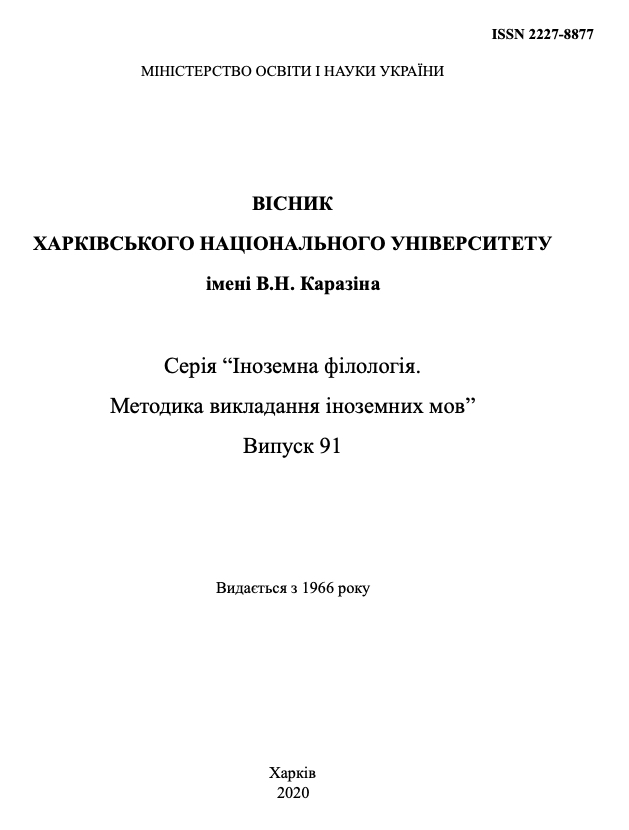The role of Martin Luther translations in modern German
Abstract
The article considers the peculiarities of the development of the German language in the Middle Upper German period of the 16th century during the Reformation on the example of Martin Luther's translations of the Bible from Latin into the national German language, which later became the basis of the main characteristics of the modern German language. This scholarly legacy has reviewed Martin Luther's translations of the Bible from Latin into its modern German language and formulated a list of the main features of Luther's translations. The work is done in line with historical linguistics, allows for comparison of facts and papers, considering real documents and works, in this case - the translation of the Bible, as well as to predict the further development of modern German language, based on the experience of linguists. The tasks in this work have been formulated in such a way as to examine and describe the object of research as accurately as possible, namely to get acquainted with the texts of Martin Luther's translations of the Bible, to analyze the main linguistic features of his translations (phonetic/spelling, grammatical, lexical) and to formulate conclusions and further prospects of research provided this opportunity. The theoretical method of research provides this article with a comprehensive and substantiated view of the facts in their diachronic study. With the help of the comparative method in the study of Martin Luther's translations, characteristic features of the modern German language were established and recorded. As you know, Luther has greatly simplified the language and systematized it in his translations to successfully convey the essence of the Bible and its laws to every resident of those times. Comparative historical research has found that the most important changes in Luther's language are fixed in the pronunciation, examples of lexical units from the Middle Upper German language and the language in translations. It was found that these simplifications and features tend to become more relevant in the future and will simplify the German language. Besides language characteristics, the article describes facts from the life of Martin Luther, which cannot be bypassed from the historical point of view.
Downloads
References
Bah A. Istorija nemeckogo jazyka. Istorija jazykov narodov [History of the German Language. History of Peoples Languages]. Moskva : URSS, 2005. 3-e izd. (in Russian)
Gans Shvarc. Martin Ljuter. Vvedenie v zhizn' i trudy [Martin Luther. Introduction to Life and Work]. Moskva : BBI, 2014. (in Russian)
Guhman M. M, Semenjuk N. N. Istorija nemeckogo literaturnogo jazyka IX-XV vv. [The History of the German Literary Language of the 9th-15th Centuries]. Moskva : Nauka, 1983. (in Russian)
Zhirmunskij V. M. Istorija nemeckogo jazyka [History of the German Language]. Moskva, 1965. (in Russian)
Levickij V. V. Osnovy sravnitel'noj fonetiki germanskih jazykov [Fundamentals of Comparative Phonetics of Germanic Languages]. Chernovcy : Ruta, 2003.(in Russian)
Levickij V. V. Osnovy sravnitel'noj morfologii germanskih jazykov [Fundamentals of Comparative Phonetics of Germanic Languages]. Chernovcy : Ruta, 2004. (in Russian)
Taranec V. G. Fonety`chni zminy` zvukiv i slova v diy`xroniyi [Phonetic Changes of Sounds and Words in Diachrony]. Nova filologiya [New Philology]. Zaporizhzhya : ZDU, 2002. #2 (13). S. 348–350. (in Ukrainian)
Jakovenko E. B. Rol' Reformacii v istorii germanskih jazykov [The Role of the Reformation in the History of Germanic Languages]. Available at: https://cyberleninka.ru/article/n/rol-reformatsii-v-istorii-germanskih-yazykov/viewer (in Russian)
Arnd E. Martin Luther: Sendbrief vom Dolmetschen und Summarien über die Psalmen und Ursachen des Dolmetschens. Halle/ Saale : Max Niemeyer, 1968. 98 S.
Bergmann R., Pauly P. Einführung in die deutsche Sprachwissenschaft. Heidelberg : Winter Verlag, 2010. 5 Aufl.
Golubenko L. N., Kulina I. G. Deutsch und seine Existenzformen in der Althochdeutscher Zeit. Germanistik in der Ukraine. Kiew, 2007. №2. S. 62–64
Schmid H. U. Einführung in die deutsche Sprachgeschichte. Metzler Stuttgart, Weimar: S. Hirzel Verlag, 2007. 10 Aufl.
Wolff G. Deutsche Sprachgeschichte von den Anfängen bis zur Gegenwart. A. Francke Verlag: Tübingen, Basel, 2009. 6. Aufl.




